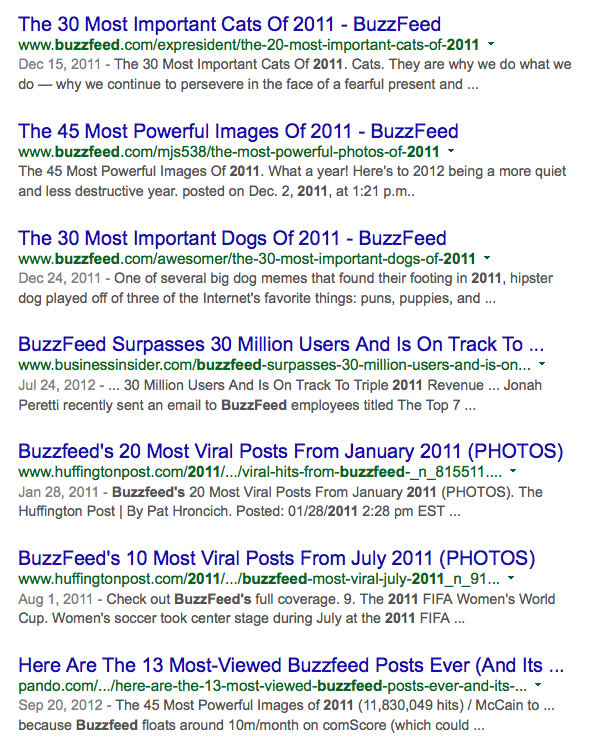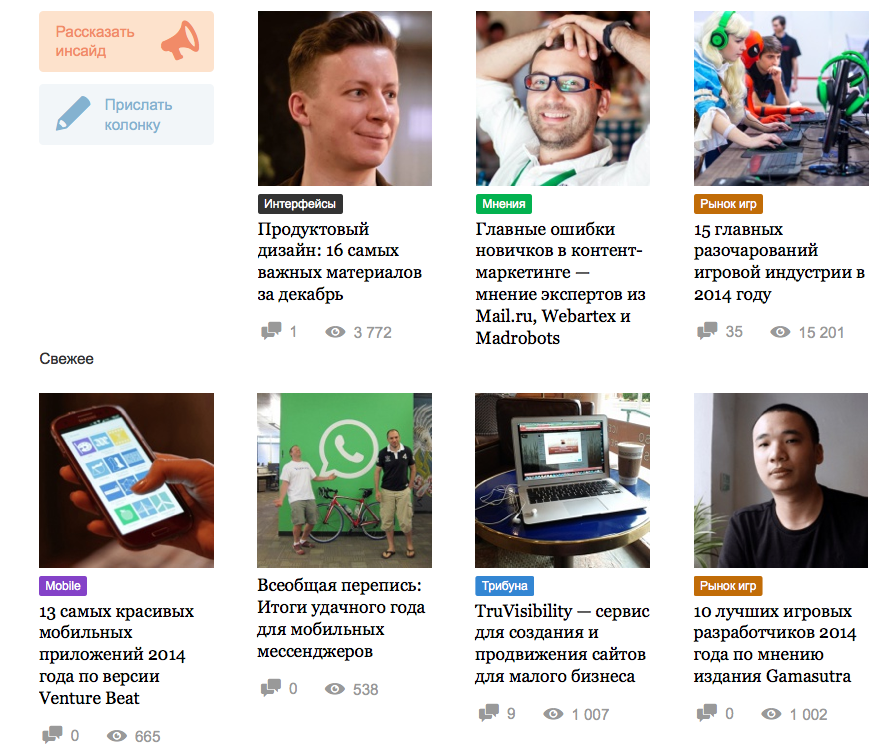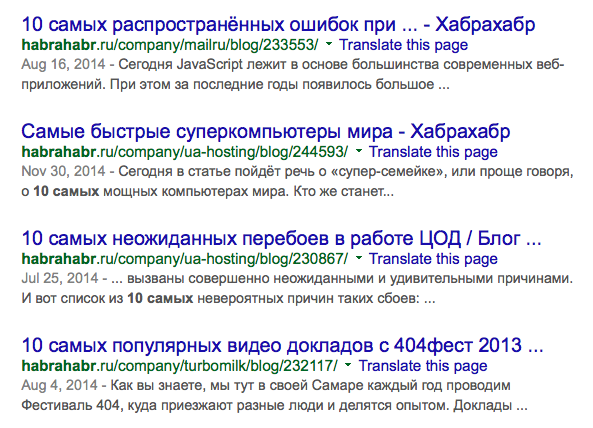What you need * (in difficult 2015)
This paper was approved by Gregory bobuk Bakunova and Chuck Norris **

Gregory is saying to us: "01,110,011 01100101 01100101 00100000 01111001 01101111 01110101 00100000 01101111 01101110 00100000 01110100 01101000 01100101 00100000 01101111 01110100 01101000 01100101 00100000 01110011 01.11001 million 01101001 01100100 01100101"
You stopudovo read (or, at least, they saw in the tapes) about a dozen vanguard articles, but not one of them was written on the basis of the performance of “the geekiest geek in Russia” ***
2015 is the year of fatally destroyed plans or magically emerging opportunities? There are as many answers as those who ask themselves this question. Only one thing is clear - IT projects are more likely to take off if they pay attention to what Grigory Bakunov told us.
Grisha has been preparing speeches about IT trends for #tceh for several years now, and most of his points come true. Here, for example, are some of those that were predicted by Bobuk and really happened in 2014.
Supervising content with collections and digests in the style of “38 most-most parrots”, which Buzzfeed was famous for in 2011, in 2014 did not use only the lazy one on Habré.


Although no, they also used it on Habré.

Data encryption ? Well of course - Telegram is growing; Fingerprint gadget lock interface is being introduced by more and more manufacturers; a startup using a heart rate as a password took off .
Machine learning ! Oh yeah! This phrase is firmly embedded instartup Bullshit Bingo this year. In any incomprehensible situation - shout “machine learning!” - and you will be happy. And maybe even an investment.
In general, Gregory did not miss last year, which means that he can be trusted in this as well.
So let's start analyzing the trends of 2015.
It was interesting to see the results of the projects in the trend of the last crisis (2008) - the shared economy , which is directly related to the new growing trend of the year 2015. Using his example, Grigory clearly demonstrated the development path of the project in difficult times: the project grows extremely slowly during the crisis - looking for a niche, monetization model, complete the team. But then, when the general economic growth begins - BENG! - and he already stands like a unicorn. The cycle takes 5-6 years. Example? Take a look at Airbnb.
The 2015 trend, associated with the shared economy phenomenon, at first glance sounds even more strange: “ cheaper does not mean worse ” - and it is already used by the most innovative players. Such as Xiaomi. The Chinese corporation, which produces top-end gadgets on Android, and now one of the four in terms of the number of devices sold, uses a pre-order model at a price cheaper than the market.
What does it give? At a minimum - market testing, but in fact - the ability to avoid lending for the release of new iron. After all, when you order at a low price, this does not mean that the price is lower than the cost, which makes it possible to issue larger series and launch them with already confirmed demand. So, really - “cheaper”! = “Worse”. In any case, for the Chinese corporation.
The second trend is a bit similar to the opinion of Captain O - “the struggle against the imperfection of the world ” - but the example that Grigory illustrated him makes you think hard and refuse labels and value judgments.
Those who used WhatsUp at its dawn remember how visually this messenger showed the presence or absence of the Internet. It was this feature that was the one that solved the real problem of many. The question: “Does it catch 3G now?” - it was solved perfectly simply - without any additional ping tests. Note - a bonus to this feature was also given a full-fledged messenger!
You will definitely like the third trend. It is called “ entertainment" Who doesn't like to have fun? And do not tell me that you are workaholics - even if this is so, it means work is your entertainment (I remember waking up at night to download my Spectrum from a cassette and enter a dozen, two or three lines that I dreamed about). But this time, Gregory was talking not about code, but about entertainment in the broadest sense: funny videos, quotes, cats, and most importantly - mobile applications.
Moreover, “mobile applications” are not necessarily games. Applications have become independent media, which entertains us, even if their functions come down to choosing a background color and a set of characters - yes, he talked about Secret. This little anonymizer briefly but intensively entertained a fair amount of the “digital party” in late spring - early summer 2014.
Related to this trend is the increasing focus of content in the visual direction. Perhaps you do not have a Facebook account and you have not noticed how they introduced the ability to comment on “stickers” (a new subset of emoticons). Gregory noted that he would not be surprised if soon (he did not specify when) the Internet would turn into a fully visual media.
The reverse side of the “entertainment” trend will hurt the optimizers of human souls and processes - most CRM, to-do lists and other time managers expect sales to drop (but Tanki Online will grow). In a crisis, no one wants to work anymore - they want more fun and distraction. Unless in time to change the communication.
If your service optimizes something - don’t say that it “simplifies life” or “makes processes transparent” - all this is perishable or even worse for people who are under stress. Say better that your service “optimizes expenses”, and even better - “increases revenues”, and then you can survive and possibly grow a little in sales.
The fourth and, as I understand it, Grigory's most favorite trend is decentralization . Total. Computing, sharing content, creating content, storing data - I say the same - all.
The examples were well disclosed in terms of Q&A with the audience after a solo performance. So, it turned out that, according to Grisha (and common sense too), the already mentioned Airbnb simply had to become a decentralized service in order to survive. After all, as you know, this service is "banned by cities" - that is, work is prohibited at the level of city administrations. To overcome this trend, it’s enough for Airbnb to start selling the franchise to local enthusiasts who find it much easier to resolve issues in their hometown than Airbnb tops from their headquarters.
Decentralization is closely intertwined with another trend, which was defined as “ hyperlocality ”. A good example is FireChat - yes, that is the most scandalous peer-to-peer-mesh application, the use of which is openly PRduring the “umbrella revolution” in Hong Kong.
Another, much more positive example, unexpectedly turned out to be our application - #tceh (so far only for green droids ), the meaning of which is to get acquainted and communicate within a specific event and decreases (but does not disappear) as people physically move away from each other friend simply because his role is to establish contact with the right person here and now.
The last (but not least) trend revealed in the speech was “ niches ”. Think corny? Maybe. But trends do not have to be mind-blowing. They must be real. And the use of niches is more than real - it is saving for a project in a crisis.
Build your niche, like Pinterest did, by becoming a homemaker recipe sharing service. And after you master it, the crisis will decline, and you can shoot a refined product into a larger audience!
This is almost the end of the description of the solo performance of Gregory. You can appreciate my interpretation in the comments after watching 25 minutes of the video , which is worth it because Grisha masterfully owns the word and listening to it is, as always, pleasant and interesting (I don’t tell you - you are familiar with Radio-T).
If you want to know more, watch a video with questions from the audience and Grisha's answers. No less exciting!
From it you will learn, for example:
- the optimal monetization model in a crisis
- why “Russian FireChat” should not be connected with politics
- what will remain on the Internet of the future: books or “game” formats
- when the “simplification” trend died
- what is the reason that “Microsoft hacked Apple again”
- which killed Zlango
- why China does not need our IT (spoiler hint: in China there are 36 popular stories for android)
Thank you for reading to the end - I enthusiastically wrote this text until 4:04 in the morning.

I want to end with a statistical fact (from a post) and a quote (from a presentation by Gregory) - a wish for all of us in the New Year.
Fact : in 1325 words of this text, “trend” is used 13 times (including this one).
Quote: “Be yourself, the rest of the roles are occupied.” Oscar Wilde
____________________________________
* “What You Need” is a fantasy story by Henry Kuttner and Katherine Moore, written in 1945
** Chuck Norris is a mythical character to whom we devote our newsletters .
*** ( c ) Nikolay ni404 Belousov

Gregory is saying to us: "01,110,011 01100101 01100101 00100000 01111001 01101111 01110101 00100000 01101111 01101110 00100000 01110100 01101000 01100101 00100000 01101111 01110100 01101000 01100101 00100000 01110011 01.11001 million 01101001 01100100 01100101"
You stopudovo read (or, at least, they saw in the tapes) about a dozen vanguard articles, but not one of them was written on the basis of the performance of “the geekiest geek in Russia” ***
2015 is the year of fatally destroyed plans or magically emerging opportunities? There are as many answers as those who ask themselves this question. Only one thing is clear - IT projects are more likely to take off if they pay attention to what Grigory Bakunov told us.
Grisha has been preparing speeches about IT trends for #tceh for several years now, and most of his points come true. Here, for example, are some of those that were predicted by Bobuk and really happened in 2014.
Supervising content with collections and digests in the style of “38 most-most parrots”, which Buzzfeed was famous for in 2011, in 2014 did not use only the lazy one on Habré.


Although no, they also used it on Habré.

Data encryption ? Well of course - Telegram is growing; Fingerprint gadget lock interface is being introduced by more and more manufacturers; a startup using a heart rate as a password took off .
Machine learning ! Oh yeah! This phrase is firmly embedded instartup Bullshit Bingo this year. In any incomprehensible situation - shout “machine learning!” - and you will be happy. And maybe even an investment.
In general, Gregory did not miss last year, which means that he can be trusted in this as well.
So let's start analyzing the trends of 2015.
It was interesting to see the results of the projects in the trend of the last crisis (2008) - the shared economy , which is directly related to the new growing trend of the year 2015. Using his example, Grigory clearly demonstrated the development path of the project in difficult times: the project grows extremely slowly during the crisis - looking for a niche, monetization model, complete the team. But then, when the general economic growth begins - BENG! - and he already stands like a unicorn. The cycle takes 5-6 years. Example? Take a look at Airbnb.
The 2015 trend, associated with the shared economy phenomenon, at first glance sounds even more strange: “ cheaper does not mean worse ” - and it is already used by the most innovative players. Such as Xiaomi. The Chinese corporation, which produces top-end gadgets on Android, and now one of the four in terms of the number of devices sold, uses a pre-order model at a price cheaper than the market.
What does it give? At a minimum - market testing, but in fact - the ability to avoid lending for the release of new iron. After all, when you order at a low price, this does not mean that the price is lower than the cost, which makes it possible to issue larger series and launch them with already confirmed demand. So, really - “cheaper”! = “Worse”. In any case, for the Chinese corporation.
The second trend is a bit similar to the opinion of Captain O - “the struggle against the imperfection of the world ” - but the example that Grigory illustrated him makes you think hard and refuse labels and value judgments.
Those who used WhatsUp at its dawn remember how visually this messenger showed the presence or absence of the Internet. It was this feature that was the one that solved the real problem of many. The question: “Does it catch 3G now?” - it was solved perfectly simply - without any additional ping tests. Note - a bonus to this feature was also given a full-fledged messenger!
You will definitely like the third trend. It is called “ entertainment" Who doesn't like to have fun? And do not tell me that you are workaholics - even if this is so, it means work is your entertainment (I remember waking up at night to download my Spectrum from a cassette and enter a dozen, two or three lines that I dreamed about). But this time, Gregory was talking not about code, but about entertainment in the broadest sense: funny videos, quotes, cats, and most importantly - mobile applications.
Moreover, “mobile applications” are not necessarily games. Applications have become independent media, which entertains us, even if their functions come down to choosing a background color and a set of characters - yes, he talked about Secret. This little anonymizer briefly but intensively entertained a fair amount of the “digital party” in late spring - early summer 2014.
Related to this trend is the increasing focus of content in the visual direction. Perhaps you do not have a Facebook account and you have not noticed how they introduced the ability to comment on “stickers” (a new subset of emoticons). Gregory noted that he would not be surprised if soon (he did not specify when) the Internet would turn into a fully visual media.
The reverse side of the “entertainment” trend will hurt the optimizers of human souls and processes - most CRM, to-do lists and other time managers expect sales to drop (but Tanki Online will grow). In a crisis, no one wants to work anymore - they want more fun and distraction. Unless in time to change the communication.
If your service optimizes something - don’t say that it “simplifies life” or “makes processes transparent” - all this is perishable or even worse for people who are under stress. Say better that your service “optimizes expenses”, and even better - “increases revenues”, and then you can survive and possibly grow a little in sales.
The fourth and, as I understand it, Grigory's most favorite trend is decentralization . Total. Computing, sharing content, creating content, storing data - I say the same - all.
The examples were well disclosed in terms of Q&A with the audience after a solo performance. So, it turned out that, according to Grisha (and common sense too), the already mentioned Airbnb simply had to become a decentralized service in order to survive. After all, as you know, this service is "banned by cities" - that is, work is prohibited at the level of city administrations. To overcome this trend, it’s enough for Airbnb to start selling the franchise to local enthusiasts who find it much easier to resolve issues in their hometown than Airbnb tops from their headquarters.
Decentralization is closely intertwined with another trend, which was defined as “ hyperlocality ”. A good example is FireChat - yes, that is the most scandalous peer-to-peer-mesh application, the use of which is openly PRduring the “umbrella revolution” in Hong Kong.
Another, much more positive example, unexpectedly turned out to be our application - #tceh (so far only for green droids ), the meaning of which is to get acquainted and communicate within a specific event and decreases (but does not disappear) as people physically move away from each other friend simply because his role is to establish contact with the right person here and now.
The last (but not least) trend revealed in the speech was “ niches ”. Think corny? Maybe. But trends do not have to be mind-blowing. They must be real. And the use of niches is more than real - it is saving for a project in a crisis.
Build your niche, like Pinterest did, by becoming a homemaker recipe sharing service. And after you master it, the crisis will decline, and you can shoot a refined product into a larger audience!
This is almost the end of the description of the solo performance of Gregory. You can appreciate my interpretation in the comments after watching 25 minutes of the video , which is worth it because Grisha masterfully owns the word and listening to it is, as always, pleasant and interesting (I don’t tell you - you are familiar with Radio-T).
If you want to know more, watch a video with questions from the audience and Grisha's answers. No less exciting!
From it you will learn, for example:
- the optimal monetization model in a crisis
- why “Russian FireChat” should not be connected with politics
- what will remain on the Internet of the future: books or “game” formats
- when the “simplification” trend died
- what is the reason that “Microsoft hacked Apple again”
- which killed Zlango
- why China does not need our IT (spoiler hint: in China there are 36 popular stories for android)
Thank you for reading to the end - I enthusiastically wrote this text until 4:04 in the morning.

I want to end with a statistical fact (from a post) and a quote (from a presentation by Gregory) - a wish for all of us in the New Year.
Fact : in 1325 words of this text, “trend” is used 13 times (including this one).
Quote: “Be yourself, the rest of the roles are occupied.” Oscar Wilde
____________________________________
* “What You Need” is a fantasy story by Henry Kuttner and Katherine Moore, written in 1945
** Chuck Norris is a mythical character to whom we devote our newsletters .
*** ( c ) Nikolay ni404 Belousov
